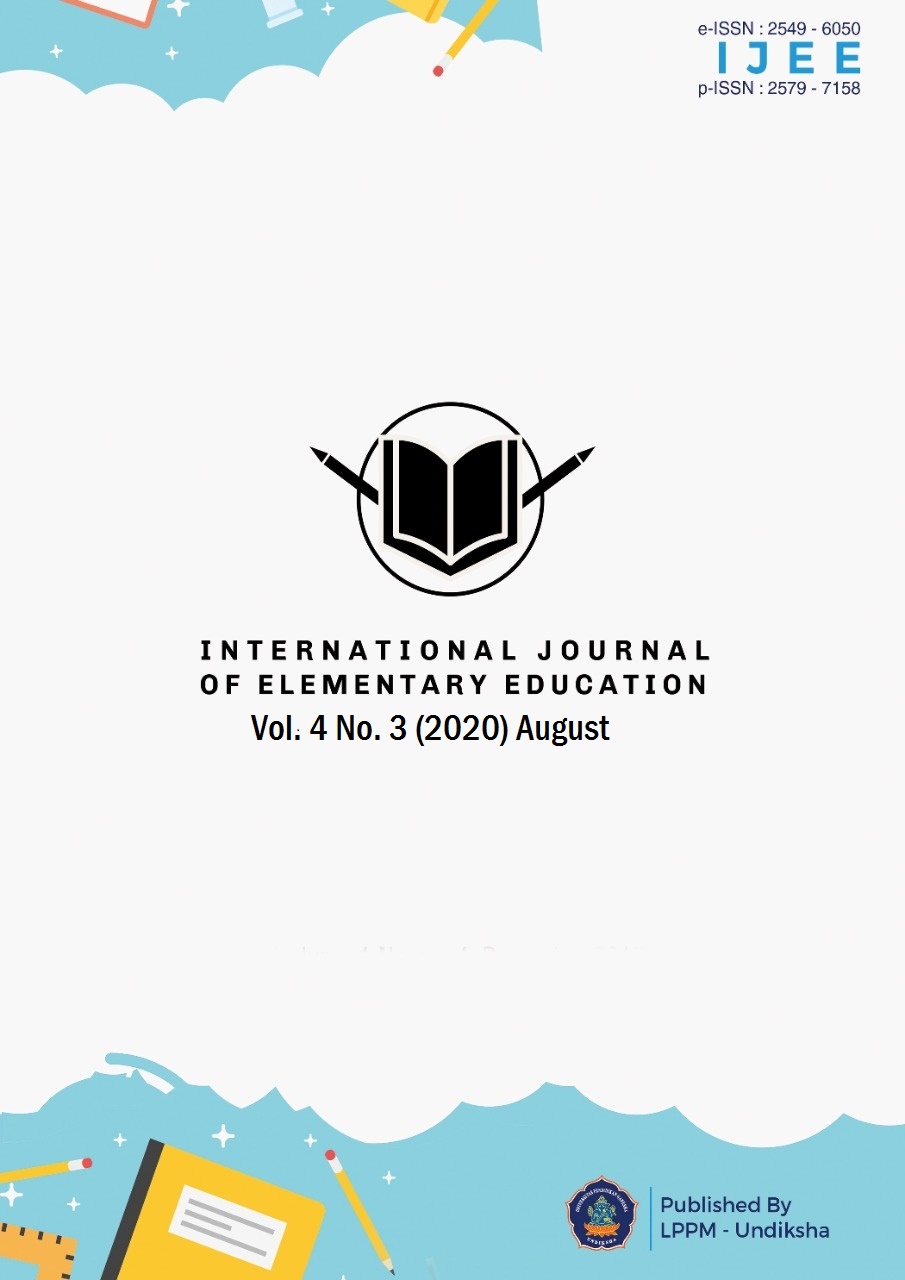The Teacher's Role in Developing Student Social Attitudes
DOI:
https://doi.org/10.23887/ijee.v4i3.28684Keywords:
social attitudeAbstract
Lack of social attitudes that students have will have an impact on students' unfavorable affective. This research aimed to analyze the role of teachers in developing students' social attitudes. This research was a qualitative research with a theoretical approach. The population in this study was all students of grade V at SD 2 Tenggeles, totaling 19 students. The data collection technique was carried out in 3 stages, namely observation, interview and documentation. The data analysis technique in this study used a variety of techniques (triangulation) and was carried out continuously to completion. The results of the analysis of students' social attitudes during the learning process found the findings of several aspects of social attitudes in students including honesty, discipline, responsibility, caring, polite and self-confidence. Social attitudes are observed through student activities in learning such as being honest in doing assignments independently and being responsible for assignments that have been given by the teacher which must be done in a timely manner. It can be concluded that the social attitude of students at SD 2 Tenggeles is fairly good. Thus, the role of the teacher in shaping students' social attitudes is very important to be applied in the daily life of students in the school, family, and community environment.
References
Ahmadi, A. (2009). Psikologi Sosial. Jakarta: Rineka Cipta.
Arifin, B. S. (2015). Psikologi Sosial. Bandung: Pustaka Setia.
Asmani, J. M. (2011). Buku Panduan Internalisasi Pendidikan Karakter di Sekolah. Yogjakarta: Diva Press.
Bunu, H. (2016). Pemindaian Penerapan Bimbingan dan Konselingdengan Pendekatan Multikultural Di Sma. Cakrawala Pendidikan, 35(3), 386–402. Retrieved from https://journal.uny.ac.id/index.php/cp/article/view/8892/pdf
Desmita. (2012). Psikologi Perkembangan Peserta Didik. Bandung: Remaja Rosdakarya.
Djamarah. (2015). Stratrgi Belajar Mengajar. Jakarta: Rineka Cipta.
Fasikhah. (2019). Hubungan Kebiasaan dan Disiplin Belajar dengan Hasil Belajar IPS. Scientific Journals, 1(3), 55-64. https://lib.unnes.ac.id/34556/
Gerungan, W. . (2004). Psikologi Sosial. Bandung: Refika Aditama.
Halimah, & Nur, U. (2017). Dampak DOPARI Terhadap Sikap Sosial Siswa SDN 02 Mojorejo Taman Kota Madiun. Jurnal Studi Sosial, 2(2), 130–142. http://doi.org/10.25273/gulawentah.v2i2.1899
Hanurawan, F. (2012). Psikologi Sosial. Bandung: Remaja Rosdakarya.
Jaedun, & Nuryadin. (2017). Dampak Pengiring Pembelajaran Pendekatan Saintifikuntuk Pengembangan Sikap Spiritual Dan Sosial Siswa. Cakrawala Pendidikan, 36(1), 44–56. Retrieved from https://journal.uny.ac.id/index.php/cp/article/view/12792/pdf
Kurniasih, I. (2014). Implementasi Kurikulum 2013 : Konsep dan Penerapan. Surabaya: Kata Pena.
Marzuki, & Basariah. (2017). The Influence Of Problem-Based Learning And Project Citizen Model In The Civic Education Learning On Student’scritical Thinking Ability And Self Discipline. Cakrawala Pendidikan, 6(3), 382–400. Retrieved from https://journal.uny.ac.id/index.php/cp/article/view/14675/pdf.
Ningsih, Sulistyaningsih, & Hardjo. (2014). Hubungan Antara Kebiasaan Belajar Dan Dukungan Orangtua Dengan Prestasi Belajar. Analitika: Jurnal Magister Psikologi UMA, 6(2), 77–83. Retrieved from https://ojs.uma.ac.id/index.php/analitika/article/view/829/801
Nurfitriana. (2015). Pengembangan Permainan Monopoli Berbasis CAI Sebagai Media Pembelajaran Pada kompetensi Dasar Menganalisis Jabatan. Jurnal Pendidikan Administrasi Perkantoran, 7(4), 51–58. https://jurnalmahasiswa.unesa.ac.id/index.php/JPAPUNESA/article/view/30701
Nurkholis. (2013). Pendidikan dalam Upaya Memajukan Teknologi. Jurnal Kependidikan, 1(24). https://doi.org/10.24090/jk.v1i1.530
Paramita. (2016). Pengaruh Learning Cycle 5E Terhadap Hasil Belajar IPA Kelas V SD Pupuan. Retrieved from http://ejournal.undiksha.ac.id/index.php/JJPGSD/article/view/6950/4740.
Puspitorini, Subali, & Jumadi. (2014). Penggunaan Media Komik Dalam Pembelajaran Ipa Untuk Meningkatkan Motivasi Dan Hasil Belajar Kognitif Dan Afektif. Cakrawala Pendidikan, 33(3), 413–420. Retrieved from https://journal.uny.ac.id/index.php/cp/article/view/2385/pdf
Renny, Sonbay, Yohana, R. (2019). the Effect of Open-Ended Teaching Model on Mathematics. 1(2), 105–110. https://doi.org/10.30822/asimtot.v1i2.275
Rosmilasar. (2018). Animasi Pendidikan Untuk Menigkatkan Karakter Siswa Sekolah Dasar. Jurnal Mimbar PGSD Undiksha, 23(3), 183–192. Retrieved from https://ejournal.undiksha.ac.id/index.php/MI/article/view/16434/9853
Sardiman. (2014). Interaksi & Motivasi Belajar Mengajar. Jakarta: PT Yamin.
Sartika, & Dahlan. (2018). Waspada Kompetensi Guru Dan Motivasi Belajar Siswa Terhadap Hasil Belajar Melalui Kebiasaan Belajar Siswa. Jurnal Manajerial, 17(1), 39. https://doi.org/10.17509/manajerial.v17i1.9760
Utami, Purnomo, & Salam. (2018). Penanaman Sikap Sosial Melalui Pembelajaran Ips Pada Siswa Smp Islam Sudirman Ambarawa Kabupaten Semarang. Sosiolum, 1(1), 40–52. https://journal.unnes.ac.id/sju/index.php/sosiolium/article/view/30446
Virani, Riastini, & Suarjana. (2016a). Deskripsi Sikap Sosial Pada Siswa Kelas IV SD Negeri 4 Penarukan Kecamatan Buleleng. Mimbar PGSD Undiksha, 4(1). http://dx.doi.org/10.23887/jjpgsd.v4i2.7699
Virani, Riastini, & Suarjana. (2016b). Deskripsi Sikap Sosial Siswa Kelas IV SD Negeri 4 Penarukan Kecamatan Buleleng Kabupaten Buleleng. Mimbar PGSD Undiksha, 4(2), 1–11. https://doi.org/http://dx.doi.org/10.23887/jjpgsd.v4i2.7699
Wuryandani, Sapriya, & Budimansyah. (2014). Pendidikan Karakter Disiplin di Sekolah Dasar. Cakrawala Pendidikan, 33(2), 286–295. Retrieved from https://journal.uny.ac.id/index.php/cp/article/view/2168/pdf.
Downloads
Published
How to Cite
Issue
Section
License
Authors who publish with the International Journal of Elementary Education agree to the following terms:
- Authors retain copyright and grant the journal the right of first publication with the work simultaneously licensed under a Creative Commons Attribution License (CC BY-SA 4.0) that allows others to share the work with an acknowledgment of the work's authorship and initial publication in this journal.
- Authors are able to enter into separate, additional contractual arrangements for the non-exclusive distribution of the journal's published version of the work (e.g., post it to an institutional repository or publish it in a book), with an acknowledgment of its initial publication in this journal.
- Authors are permitted and encouraged to post their work online (e.g., in institutional repositories or on their website) prior to and during the submission process, as it can lead to productive exchanges, as well as earlier and greater citation of published work. (See The Effect of Open Access)









